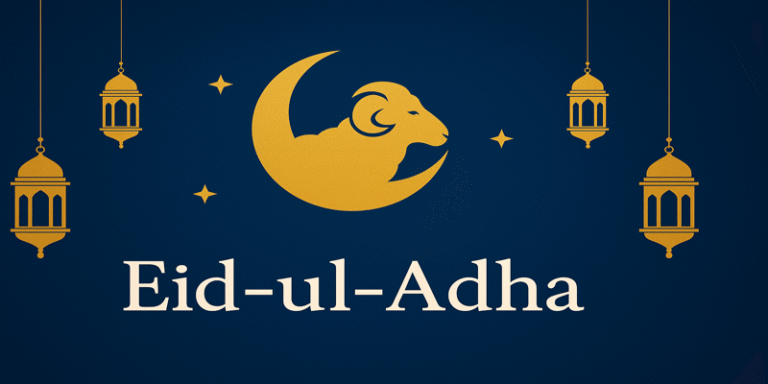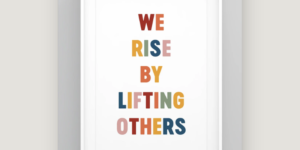Eid-ul-Adha, also known as the Festival of Sacrifice, is one of the most significant celebrations in the Islamic calendar. It is observed by Muslims around the world to commemorate the unwavering faith and obedience of Prophet Ibrahim (Abraham) to God’s command. The festival symbolises devotion, sacrifice, and the importance of charity, values deeply embedded in Islamic teachings. Beyond the rituals, Eid-ul-Adha is also a time for social solidarity, family gatherings, and community welfare.
Historical and Religious Background
The origins of Eid-ul-Adha lie in the Qur’anic story of Prophet Ibrahim, who was commanded by Allah to sacrifice his son Ismail (Ishmael) as a test of faith. As Ibrahim prepared to carry out the sacrifice, God intervened and provided a ram to be sacrificed in Ismail’s place (Qur’an 37:102–107). This event, signifying obedience to God and divine mercy, is central to the religious and spiritual meaning of the festival (Esposito, 2003).
The festival is observed on the 10th day of Dhul-Hijjah, the last month of the Islamic lunar calendar, and coincides with the completion of the Hajj pilgrimage in Makkah. Hajj is one of the five pillars of Islam and is obligatory for all Muslims who are physically and financially able to undertake it at least once in their lifetime (Nasr et al., 2003).
Ritual Practices
Eid-ul-Adha begins with a special congregational prayer performed at the mosque or an open field. The sermon (khutbah) delivered by the imam usually highlights the significance of the day, the story of Ibrahim, and the importance of sacrifice and charity.
The most prominent ritual of Eid-ul-Adha is the Qurbani, or the sacrificial slaughter of an animal—typically a sheep, goat, cow, or camel. This act emulates Ibrahim’s willingness to sacrifice his son in obedience to God. The meat from the sacrifice is traditionally divided into three parts: one-third for the family, one-third for relatives and friends, and one-third for the needy (Kamali, 2008).
The sacrifice must follow specific guidelines, including humane treatment of animals and invoking the name of Allah at the time of slaughter. These rules are derived from Islamic jurisprudence (fiqh) and aim to ensure ethical treatment and spiritual intention (al-Nawawi, 2007).
Cultural Variations and Observance
Though the core principles of Eid-ul-Adha are the same, the way it is celebrated varies across cultures and countries. In the Middle East, South Asia, Africa, and Southeast Asia, the festival is marked by communal prayers, lavish feasts, and cultural performances. In many countries, it is a public holiday, allowing families to gather and celebrate together.
In the United Kingdom, where a significant Muslim population resides, Eid-ul-Adha is celebrated with mosque prayers, family gatherings, and community service. Due to legal and health regulations, the Qurbani is usually carried out by authorised slaughterhouses on behalf of the individuals (Muslim Council of Britain, 2020).
Ethical and Social Dimensions
Eid-ul-Adha emphasises the value of charity and compassion. The act of sharing meat with the poor and needy ensures that even the most vulnerable members of society can partake in the festivities. This reflects Islam’s core principle of social justice and community welfare (Sardar & Davies, 2003).
Moreover, the festival promotes environmental and ethical awareness regarding food consumption and animal welfare. Modern interpretations increasingly stress responsible slaughtering practices and sustainable methods in line with Islamic ethics (Foltz, 2006).
Contemporary Challenges and Adaptations
In recent years, Eid-ul-Adha has also faced logistical, ethical, and legal challenges. Urbanisation, stricter animal welfare laws, and the growing awareness of environmental issues have led to changes in how the Qurbani is practised. In Western countries, such as the UK and Canada, Muslims often perform symbolic sacrifices or donate money to charities that carry out the ritual on their behalf in developing countries (Pew Research Center, 2012).
COVID-19 further highlighted the need for flexible and community-oriented approaches. Many families opted for online Qurbani through certified organisations, ensuring that the essence of the ritual—charity and sacrifice—was upheld even during lockdowns (Islamic Relief, 2020).
Philosophical and Spiritual Significance
Beyond rituals, Eid-ul-Adha is a profound reminder of spiritual submission and moral values. Prophet Ibrahim’s story embodies trust in divine wisdom and the human capacity for selflessness. His readiness to sacrifice what he held most dear exemplifies the depth of faith and ethical maturity (Nasr, 2002).
The concept of taqwa (God-consciousness) is central to the festival. As stated in the Qur’an, “It is neither their meat nor their blood that reaches Allah, but it is your piety that reaches Him” (Qur’an 22:37). This verse reinforces the idea that the ritual of sacrifice must be underpinned by sincere intention and spiritual mindfulness.
Eid-ul-Adha is not merely a ritualistic celebration; it is a deeply symbolic event that integrates faith, ethics, and social responsibility. It encourages Muslims to reflect on the values of sacrifice, compassion, and generosity in their daily lives. As communities around the world continue to adapt the festival to modern contexts, the timeless messages of Eid-ul-Adha remain profoundly relevant.
Whether observed through traditional sacrifice, charitable giving, or spiritual reflection, the festival continues to inspire acts of kindness and solidarity, transcending borders and cultures.
References
al-Nawawi, Y. (2007). Al-Majmu’ Sharh al-Muhadhdhab. Damascus: Dar al-Fikr.
Esposito, J. L. (2003). The Oxford Dictionary of Islam. Oxford: Oxford University Press.
Foltz, R. (2006). Animals in Islamic Tradition and Muslim Cultures. Oxford: Oneworld Publications.
Islamic Relief (2020). Qurbani during COVID-19: Continuing the Legacy of Sacrifice. [online] Available at: https://www.islamic-relief.org/qurbani
Kamali, M. H. (2008). Shari’ah Law: An Introduction. Oxford: Oneworld Publications.
Muslim Council of Britain (2020). Eid Guidance for British Muslims. [online] Available at: https://www.mcb.org.uk/resources/eid-guidance
Nasr, S. H. (2002). The Heart of Islam: Enduring Values for Humanity. New York: HarperOne.
Nasr, S. H., Dagli, C. K., Dakake, M. M., Lumbard, J. E. B. and Rustom, M. (2003). The Study Quran: A New Translation and Commentary. New York: HarperOne.
Pew Research Center (2012). The Future of the Global Muslim Population. [online] Available at: https://www.pewresearch.org
Sardar, Z. and Davies, M. W. (2003). Why Do People Hate America? Cambridge: Icon Books.









